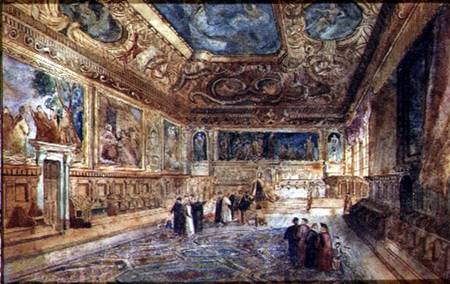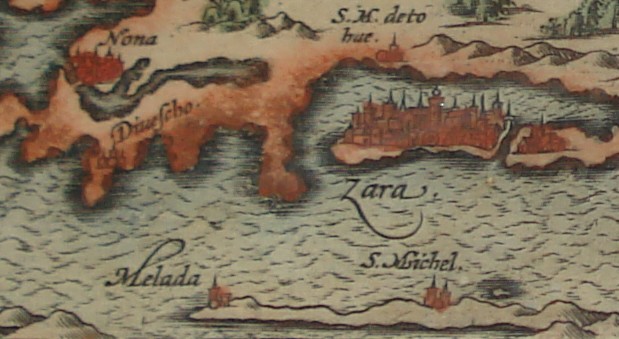As the POD of this TL averts the Fourth Crusade, the conquest and collapse of the (Eastern) Roman Empire (a.k.a Byzantium or
Rhōmania) does not happen, at least in the same way. My question to my lovely readers is therefore; what do you expect to see happen to the Empire? I have a few ideas - those of you who read the original TL will have some idea of what these might be - but I would appreciate input, discussion and debate to help ensure that what I write about its fate is well-informed and grounded in historical realities. Please feel free to discuss this with me and between yourselves in thread!
Now, the update:
__________________________________________________________________________________
Dalmatia, circa 1202 (East at the top)
____________________________________________________________________________________________
Reactions
__________________________________________________________________________________
The Dalmatian city-states, including municipalities such as Ragusa, Spalatro, and Zara, had existed since the Slavic invasions of Illyria after the fall of Rome. The Dalmatian people were largely Latinate, descendants of the Roman population which had inhabited the region during the years of Imperial strength. Like the Venetians in their Lagoon, the Dalmatians sought refuge from invaders in defended coastal enclaves. Initially dominated solely by Latin culture and language, over the years a fusion of Romantic and Slavic cultures was established as Croats from the hinterland began to migrate to the coastal cities
[1].
By 1202, this state of affairs had endured for many long years, despite the ever-shifting nature of geopolitics, which placed the cities successively under Greek, Hungarian, Croatian and Venetian control during different time periods. By this time the cities were divided in their loyalties - most of the northern cities were under the protection of King Emeric of Hungary, whilst many of the southern cities and offshore islands were nominally subject to the Greek Emperor in Constantinople.
Venice had exerted control over many of the Dalmatian cities in times past, leading them in league against the Narentine pirates of Pagania in the 11th century
[2]. Since that time the Republic had claimed the territories as its own, disputing the Hungarian claim to sovereignty. It was particularly gruelling for the Venetians in 1181, when the Zaratins revolted against their unpopular rule and proclaimed their allegiance to the Hungarian Crown
[3]. This occurred concurrently to a general loss of Venetian control over the rest of Dalmatia, and even western Istria
[4].
Doge Dandolo coveted the Adriatic littoral for its wealth, to gain supreme control of the Adriatic trade routes, and to eliminate their commercial rivals - in particular, Zara and Ragusa.
The leaders of the Dalmatian cities saw the looting and burning of Istria, and feared the wrath of the Serene Republic. On the 10th of October 1202 the Zaratin
Comes, Antonio Begna, dispatched envoys to Ragusa, Tragura and the other cities, with important instructions for his legations
[5].
__________________________________________________________________________________
Extract from: A Study of the Istrian War
__________________________________________________________________________________
A contemporary letter:
(From Pero Detrico, Bailo Plenipotentiary of the government of His Serenity Comes Antonio Begna of Zara to the court of His Serenity Rector Marco Caboga of Ragusa; to His Excellency Todra Celio, Bailo Plenipotentiary of Tragura to the court of His Serenity Comes Marco Caboga of Ragusa.)
12th October 1202
Your Excellency:
An issue has come to the notice of the Zaratin legation in Ragusa, the significance of which may outstrip any other which we have faced in recent years. However, as it appears to involve governmental matters, here in Ragusa, at Zara, and to your government in Tragura, I am convinced that I am right to seek a direct correspondence with you. Frankly, I am unwilling to pursue this issue further without your advice.
Put succinctly, the situation is as follows: We have information, here at the Zaratin Legation, which suggests that a General Council of the eight Dalmatian cities is to take place. This information was obtained yesterday from a junior envoy, a man called Damian Zadulin, who arrived from Zara that morning; he is being accommodated here with all required privileges. Upon arrival, he had in his possession a manuscript, containing a number of documents; these are of such an astonishing nature that the under-officials declined to assume responsibility for them beyond conducting the man to the Legation.
Having held audience with this envoy and examined his documents, I am, I confess, in a similar position. This is not any ordinary diplomatic intrigue; there is something very strange and new here. The contents of these documents, taken alone, are unprecedented, which encourages the belief that they have been fabricated. I cannot in good faith adopt this theory, however, as the envoy appears a man of perfect integrity, and because he bears the seal of my master, His Serenity the Comes.
The documents in question include, along with copies of the various charters and letters of safe conduct issued by my government at Zara, a direct letter to me and the chief officers of the Zaratin Legation from the His Serenity the Comes himself. This last is deserving of your particular attention; ordinarily I would not attach a private message from my government in any correspondence with representatives of a foreign power, but you shall find it affixed to the reverse of this page. Put briefly, it contains instruction and authority from my master to request and require in the name of His Serenity the presence of Ragusan governmental officials at a council of the Dalmatian polities, to be held on the sixteenth of this month.
The envoy, Damian Zadulin, is now lodged in an apartment here at the Legation; he is being treated with every consideration, and will be available for an audience with the Traguran Legation upon request.
I am, most anxiously awaiting your advice,
Pero Detrico
__________________________________________________________________________________
Footnotes:
[1] There is some dispute concerning the degree of Slavicisation in the Dalmatian cities by 1200. What seems clear is that governmental matters were usually dealt with in the Dalmatian language (which evolved from regional dialects of Latin) whereas Slav was becoming more prevalent among the masses. My aim in TTL is to have the 'Ragusan model' operate on a pan-Dalmatian scale - i.e. in fear of Slavicisation, Dalmatian
officially becomes the sole permitted language in governance in all eight cities, ultimately trickling down into education and thus preserving the language. Ultimately a bilingual society will probably develop. Hopefully this wasn't too much of a spoiler, but I wanted to preempt nationalistic concerns.
[2] This occurred IOTL, perhaps the earliest instance during which Venice was the supreme authority in Dalmatia (willingly accepted by Zara and the others at the time).
[3] This occurred IOTL.
[4] We know that Venice retained influence in Istria as late as 1192, when the Republic recovered the city of Pola from an occupying Pisan force. However, as Venice had to use force to reassert control even IOTL, it is clear that this power had been lost by 1202.
[5] This is important; basically, IOTL such a summons was never issued because the Venetian attack came so swiftly - at least, that's the assumption of this TL. There is historic precedent for common Dalmatian alliances (see the above mention of the Narentine pirates), so I believe the calling of such a Council is plausible, perhaps even probable, in response to a Venetian conquest of Istria in conjunction with disclosed plans for an invasion of Dalmatia.
__________________________________________________________________________________
Please let me know what you thought of the use of a letter as part of the narrative. Would you like to see more?
Any other feedback appreciated and encouraged.
Thanks!
-
Iluvatar


